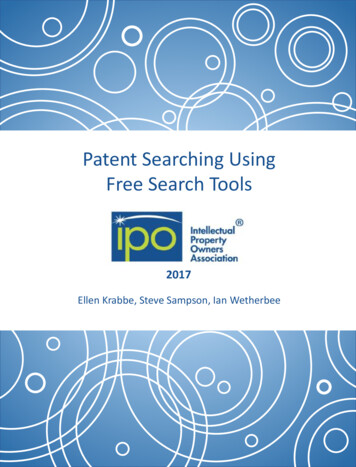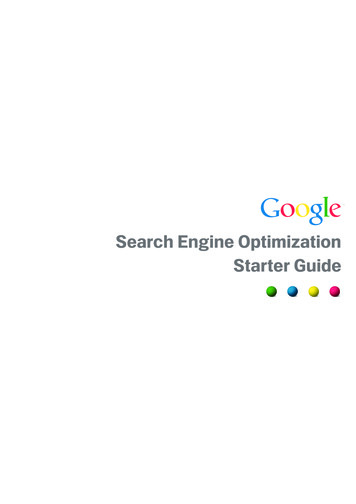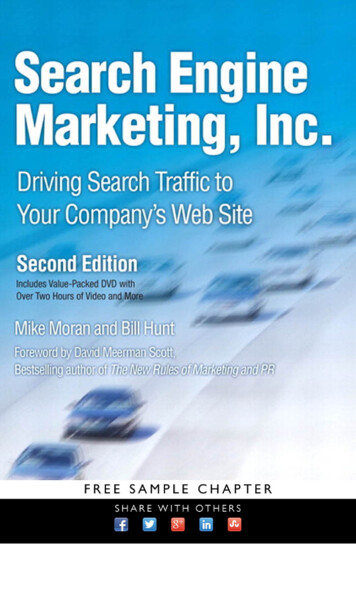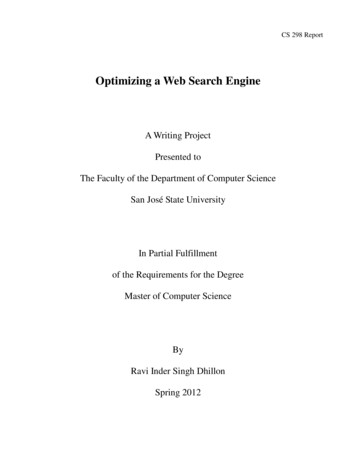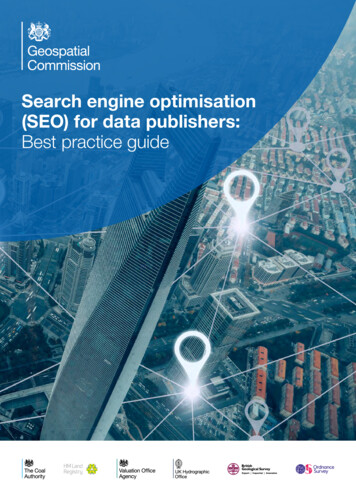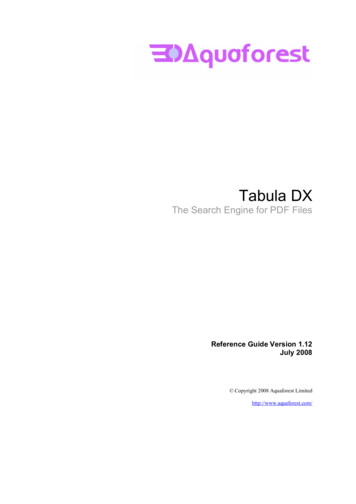
Transcription
MARCH 9, 2012Search Engine Use 2012Even though online Americans are more satisfied than ever withthe performance of search engines, strong majorities havenegative views of personalized search results and targeted adsKristen PurcellAssociate Director for Research, Pew InternetProjectJoanna BrennerWeb Coordinator, Pew Internet ProjectLee RainieDirector, Pew Internet ProjectPew Research Center’s Internet & American Life Project1615 L St., NW – Suite 700Washington, D.C. 20036Phone: arch-Engine-Use-2012.aspx
Summary of findingsSearch engines remain popular—and users are more satisfied than ever with the quality of searchresults—but many are anxious about the collection of personal information by search engines and otherwebsites.Most search users disapprove of personal information being collected forsearch results or for targeted advertisingThe Pew Internet & American Life survey in February 2012 included several questions probing howrespondents feel about search engines and other websites collecting information about them and usingit to either shape their search results or target advertising to them. Clear majorities of internet andsearch users disapprove of these practices in all the contexts we probed.Specifically, the survey posed the following choices to search engine users:65% say 29% say 73% say theywould 23% say theywould It’s a BAD thing if a search engine collected information about your searches andthen used it to rank your future search results, because it may limit theinformation you get online and what search results you seeIt’s a GOOD thing if a search engine collected information about your searchesand then used it to rank your future search results, because it gives you resultsthat are more relevant to youNOT BE OKAY with a search engine keeping track of your searches and using thatinformation to personalize your future search results because you feel it is aninvasion of privacyBe OKAY with a search engine keeping track of your searches and using thatinformation to personalize your future search results, even if it means they aregathering information about youAll internet users were posed the following choice regarding targeted advertising:68% say 28% say 2I’m NOT OKAY with targeted advertising because I don’t like having my onlinebehavior tracked and analyzedI’m OKAY with targeted advertising because it means I see advertisements andget information about things I’m really interested inpewinternet.org
Overall views of search engine performance are very positiveFor more than a decade, Pew Internet data has consistently shown that search engine use is one of themost popular online activities, rivaled only by email as an internet pursuit. In January 2002, 52% of allAmericans used search engines. In February 2012 that figure grew to 73% of all Americans. On any givenday in early 2012, more than half of adults using the internet use a search engine (59%). That is doublethe 30% of internet users who were using search engines on a typical day in 2004. And people’sfrequency of using search engines has jumped dramatically.Moreover, users report generally good outcomes and relatively high confidence in the capabilities ofsearch engines: 91% of search engine users say they always or most of the time find the information they areseeking when they use search engines73% of search engine users say that most or all the information they find as they use searchengines is accurate and trustworthy66% of search engine users say search engines are a fair and unbiased source of information55% of search engine users say that, in their experience, the quality of search results is gettingbetter over time, while just 4% say it has gotten worse52% of search engine users say search engine results have gotten more relevant and useful overtime, while just 7% report that results have gotten less relevantThese findings are a backdrop for the ongoing policy debates about privacy, collection of personalinformation online, and the enthusiasm for targeted search and targeted advertising among companies.They also arise as Google implements a new privacy policy in which information about users’ onlinebehavior when they are signed into Google’s programs can be collected and combined into a cohesiveuser profile. This includes material from Google’s search engine, the Google social networking site,YouTube video-sharing site, and Gmail.Most internet users say they do not know how to limit the information that iscollected about them by a websiteJust 38% of internet users say they are generally aware of ways they themselves can limit how muchinformation about them is collected by a website. Among this group, one common strategy people useto limit personal data collection is to delete their web history: 81% of those who know ways to managethe capture of their data do this. Some 75% of this group uses the privacy settings of websites to controlwhat’s captured about them. And 65% change their browser settings to limit the information that iscollected.11There are a range of other strategies that users can employ, including the deletion of cookies and the use ofanonymyzing software and proxies that were not part of this survey.3pewinternet.org
Overall, search users are confident in their abilitiesMost search users say they are confident in their own search abilities, and find what they are looking formost of the time. More than half of search users (56%) say they are very confident in their searchabilities, while only 6% say they are not too or not all confident. And the vast majority of search usersreport being able to find what they are looking for always (29%) or most of the time (62%).Positive search experiences are more common than negative experiencesAsked about different experiences they have had using search engines, more users report positiveexperiences than negative. They said in their use of search engines they had: learned something new or important that really helped them or increased their knowledge (86%of search users have had this experience)found a really obscure fact or piece of information they thought they would not be able to find(50%)gotten conflicting information in search results and not been able to figure out what is correct(41%)gotten so much information in a set of results that you feel overwhelmed (38%)found that critical information is missing from search results (34%)Google continues to be the most popular search engine, by a wide marginGoogle continues to dominate the list of most used search engines. Asked which search engine they usemost often, 83% of search users say Google. The next most cited search engine is Yahoo, mentioned byjust 6% of search users. When we last asked this question in 2004, the gap between Google and Yahoowas much narrower, with 47% of search users saying Google was their engine of choice and 26% citingYahoo.About the surveyThese are the findings from a survey conducted from January 20-February 19, 2012 among 2,253 adultsage 18 and over, including 901 cell phone interviews. Interviews were conducted in English and Spanish.The margin of error for the full sample is plus or minus 2 percentage points.4pewinternet.org
Main findingsSearch engine use over timeA February 2012 Pew Internet survey finds that 91% of online adults use search engines to findinformation on the web, up from 84% in June 2004, the last time we did an extended battery of surveyquestions about people’s search engine use. On any given day online, 59% of those using the Internetuse search engines. In 2004 that figure stood at just 30% of internet users.As early as 2002, more than eight in ten online adults were using search engines, and as we noted in anAugust 2011 report2, search is only rivaled by email both in the overall percent of internet users whoengage in the activity and the percent of internet users doing it on a given day. The table below showshow search compares over time with some other popular online activities.Over time, search has remained one of the most popular internetactivities% of internet users who do each activity100%93%80%92%91%85%76%71%71%66%60%61%Send orreademailUse asearchengineGetnewsonline40%Buy 0420052006200720082009201020112012Source: The Pew Research Center's Internet & American Life Project tracking surveys, 2002-2012. Social network siteuse not tracked prior to February, 2005. For more activity trends, go to pewinternet.org. “Get news online” and “buya product online” have not yet been asked in 2012 surveys.2See “Search and Email Still Top the List of Most Popular Online Activities,” available nd-email.aspx5pewinternet.org
Search is most popular among young adult internet users, those who have been to college, and thosewith the highest household incomes. These same groups—the young, college-educated, and affluent—are also most likely to report using a search engine “yesterday.” And while white and black online adultsare more likely than Hispanics to report using search overall, white online adults stand out from allothers as more likely to use search on a given day.Who uses search?% of online adults in each group who use search enginesAll online adultsGenderMaleFemaleRace/EthnicityWhiteAfrican AmericanHispanicAge18-2930-4950-6465 EducationSome high schoolHigh schoolSome collegeCollege graduateHousehold income 30,000 30,000 - 49,999 50,000 - 74,999 75,000 % of each groupwho ever usesearch engines91%% of each group whoused a search *76** Denotes statistically significant difference with other rows in that categorySource: The Pew Research Center's Internet & American Life Project Winter 2012 TrackingSurvey, January 20-February 19, 2012. N 2,253 adults age 18 and older, including 901 cellphone interviews. Interviews conducted in English and Spanish. The margin of error is plusor minus 3 percentage points for internet users.Asked how often they use a search engine to find information online, just over half of all search engineusers (54%) say they do this at least once a day, a significant increase over 2004.6pewinternet.org
Search users are turning to search engines more frequently% of adult search users who use a search engine to find information .100%80%60%54%*200440%35%201218% 16%20%18%15%15%*14%*7%9%1%0%Once a dayor more3-5 days aweek1-2 days aweekOnce everyfew weeksLessoften/NeverDK/RefSource: The Pew Research Center's Internet & American Life Project Winter 2012 Tracking Survey, January 20-February 19,2012. N 2,253 adults, age 18 and older, including 901 cell phone interviews. Interviews conducted in English and Spanish. Anasterisk (*) indicates a significant difference across years at the .95 confidence level.Frequency of search engine use varies by age, education and income, with adults under age 50 andthose with more education and higher household incomes using search more frequently than others.7pewinternet.org
Daily searching is most common among younger, more educated and moreaffluent search engine usersFrequency of search engine use among each group of search users .Total [n 1,614]54%30%15%1%18-29 [n 314]60%26%14%30-49 [n 508]60%27%13%50 [n 756]41%39%College grad [n 667]70%Some college [n 423]23%57%HS grad or less [n 515]27%26%33%* 30K [n 344]20%Weekly6%30%41%0%11% 1%36%68%30K to 75K [n 516]16%36%40%1%7%31%36%75K [n 507]Daily19%60%Less often23%80%100%DK/RefSource: The Pew Research Center's Internet & American Life Project Winter 2012 Tracking Survey, January 20-February 19,2012. N 2,253 adults, age 18 and older, including 901 cell phone interviews. Interviews conducted in English and Spanish.8pewinternet.org
Google is far and away the most popular search engineAmong search engine users, Google dominance continues and it is far and away the search engine theyreport using most often. Fully 83% of searchers use Google more often than any other search engine.Yahoo is a very distant second at just 6%. In 2004, the gap between these two search leaders was muchnarrower. At that time, 47% said that Google was the search engine they used most often while 26%named Yahoo.Google is far and away the search engine of choice, preferred by 83% ofsearch users% of search users who answered the question: Which search engine do you use MOST le47%Google83%Yahoo26%20042012Source: The Pew Research Center's Internet & American Life Project Winter 2012 Tracking Survey, January 20-February 19,2012. N 2,253 adults, age 18 and older, including 901 cell phone interviews. Interviews conducted in English and Spanish.9pewinternet.org
Quality of informationFairly large majorities of search engine users express confidence in these tools and the results theygenerate. Not only does a majority believe that search engines are fair and unbiased, they also believethat most results are accurate and trustworthy. And most say that the quality and relevance of searchresults has been improving over time or has not changed, while very few see the quality and relevanceof results declining.Bias and accuracyThere continues to be widespread faith in search results, and perceptions of fairness and bias have notchanged at all over the past eight years. Roughly two-thirds of searchers (66%) say search engines are afair and unbiased source of information. In 2004, 68% of search users said that search engines were afair and unbiased source of information.Asked how much of the information they get in search results is accurate or trustworthy, 28% say all oralmost all and another 45% say most.Most adult search engine users have faith in the fairness and accuracy oftheir resultsIn general, do you think Internet search engines are a fair and unbiased source of information, or do you thinksearch engines are NOT a fair and unbiased source?Based onsearchusers[n 812]66%0%20%20%40%Yes, fair and unbiased60%No, not fair and unbiased3%10%80%Depends (VOL)100%DK/RefIn general, how much of the information you find using search engines do you think is accurate ortrustworthy?Based onsearchusers[n 802]28%0%20%All or almost all45%Most40%Some60%Very little/None22%80%DK/Ref3% 1%100%Source: The Pew Research Center's Internet & American Life Project Winter 2012 Tracking Survey, January 20-February19, 2012. N 2,253 adults, age 18 and older, including 901 cell phone interviews. Interviews conducted in English andSpanish.10pewinternet.org
Younger search engine users have more faith in the results they get. 72% of 18-29 year-olds say thatsearch engines are a fair and unbiased source, compared with 65% of 30-49 year-olds, 67% of 50-64year-olds, and just 54% of search users age 65 and older.Where accuracy and trustworthiness are concerned, women are slightly more likely than men (76% v.69%) to feel that all or most of the results they get are accurate and trustworthy. Search users living inthe highest income households are also slightly more likely than others to believe that all or most oftheir results can be trusted.Relevance and quality over timeHalf of adult search users (52%) say search results have gotten more relevant and useful over time, whilejust 7% see them as getting less relevant or useful. The remaining 40% see no change over time. Asimilar question about changes in the quality of information over time yields similar results. Just overhalf of adult search users (55%) say that in their experience the quality of search results has gottenbetter over time, while 4% say the quality has gotten worse.Most adult search engine users say the relevance and quality of resultsare improving over timeOverall, in your experience, are search engine results getting MORE relevant and useful over time,LESS relevant and useful, or have you not seen any real difference over time?Based onsearchusers[n 812]52%0%20%7%40%More relevant40%60%Less relevant1%80%No difference100%DK/RefOverall, in your experience, is the QUALITY of the information you get using search engines gettingBETTER over time, WORSE over time, or have you not seen any real difference?Based onsearchusers[n 802]55%0%20%Better4%40%Worse60%No difference39%2%80%100%DK/RefSource: The Pew Research Center's Internet & American Life Project Winter 2012 Tracking Survey, January20-February 19, 2012. N 2,253 adults, age 18 and older, including 901 cell phone interviews. Interviewsconducted in English and Spanish.11pewinternet.org
Adult search users under age 50 are slightly more likely than older search users to feel the quality ofsearch results is improving over time. Older adult search users, in contrast, are more likely to see nodifference in quality. There are no notable demographic differences where perceptions of relevance areconcerned.Search users under age 50 are slightly more likely to say the quality ofresults is improving over timeOverall, in your experience, is the QUALITY of the information you get using search engines gettingBETTER over time, WORSE over time, or have you not seen any real difference?Search users50 [n 367]50%Search users18-49 [n 419]3%58%*0%20%Better5%40%Worse45%*60%No difference36%80%3%1%100%DK/RefSource: The Pew Research Center's Internet & American Life Project Winter 2012 Tracking Survey, January 20-February19, 2012. N 2,253 adults, age 18 and older, including 901 cell phone interviews. Interviews conducted in English andSpanish. An asterisk (*) indicates a significant difference across age groups at the 95% confidence level.Searchers’ experiences and perceptions of their own abilitiesSearch engine users not only have confidence in the information they get using these tools, they alsohave confidence in their own search abilities and report finding what they are looking for most or all ofthe time.In 2012, just over half of search users (56%) say they are very confident in their search abilities, which isa small but significant increase over 2004 when 48% felt this confident. Another 37% of search userstoday describe themselves as somewhat confident, with fewer than one in ten saying they are not too ornot at all confident in their ability to use search engines to find information online.12pewinternet.org
Search users are only slightly more confident in their search abilities thanthey were in 2004How CONFIDENT do you feel about your own searching abilities when using a search engine to findinformation online?2012 searchusers [n 802]56%*2004 searchusers [n 1,165]37%48%0%Very6% 2%44%*20%Somewhat5% 1%40%Not tooNot at all60%80%100%DK/RefSource: The Pew Research Center's Internet & American Life Project Winter 2012 Tracking Survey, January 20-February19, 2012. N 2,253 adults, age 18 and older, including 901 cell phone interviews. Interviews conducted in English andSpanish. An asterisk (*) indicates a significant difference across years at the 95% confidence level.Search users under age 50 are more likely to say they are very confident in their search abilities whencompared with those age 50 and older (64% v. 40%), as are search users who have some collegeeducation when compared with those who do not (64% v. 45%). And while 68% of adults living inhouseholds with incomes of 75,000 or greater say they are very confident in their ability to findinformation online using search engines, the same is true of only about half of adults in all other incomeranges.In addition to expressing more confidence, search users in 2012 are also slightly more likely than theywere in 2004 to say that they always find the information they are looking for. While 29% of searchengine users today say this is the case, just 17% reported the same in 2004. Still, in both 2012 and 2004,the majority of search users say they find what they are looking for most of the time, but not always.While there are few notable demographic effects in terms of one’s perception of their ability to findwhat they are looking for, the one group that stands out in this regard is adults living in the lowestincome households. This group is more likely than any other to say they always find what they arelooking for, with 37% reporting this.13pewinternet.org
Search users in 2012 are more likely to report always finding theinformation they are searching forWhen you use a search engine to look for information online, how often do you actually FIND theinformation you’re looking for?2012 searchusers [n 812]29%*2004 searchusers [n 1,165]62%17%0%70%*20%Always7% 2%Most of the time40%11%60%80%Only sometimesHardly ever1%100%DK/RefSource: The Pew Research Center's Internet & American Life Project Winter 2012 Tracking Survey, January 20-February19, 2012. N 2,253 adults, age 18 and older, including 901 cell phone interviews. Interviews conducted in English andSpanish. An asterisk (*) indicates a significant difference across years at the 95% confidence level.More search users report more positive experiences than negativeexperiencesGiven the largely positive view of the quality of information search engines yield, and their own searchabilities, it is not surprising that many search users report positive experiences using these tools. Morethan eight in ten searchers say they have learned something new or important using a search enginethat really helped them or increased their knowledge. And half say they were able to find a reallyobscure fact or piece of information using a search engine.Yet despite these positive occurrences, many respondents also report having experienced the downsideof search. Four in ten searchers say they have gotten conflicting or contradictory search results andcould not figure out what information was correct. About four in ten also say they have gotten so muchinformation in a set of search results that they felt overwhelmed. About one in three have had theexperience of discovering that really critical or important information was missing from search resultsthey got.14pewinternet.org
More adult search users report positive experiences than negativeexperiences% of adult search engine users who have experienced each of the following Learned something new or important using asearch engine that really helped you or increasedyour knowledge86%Found a really obscure fact or piece ofinformation you didn't think you'd be able to find50%Got conflicting or contradictory information inresults and could not figure out what was correct41%Got so much information in a set of searchresults that you felt overwhelmed38%Discovered really critical information was missingfrom search results34%0%20%40%60%80%100%Source: The Pew Research Center's Internet & American Life Project Winter 2012 Tracking Survey, January 20-February 19,2012. N 2,253 adults, age 18 and older, including 901 cell phone interviews. Interviews conducted in English and Spanish. Themargin of error is plus or minus 3 percentage points for total adult search users.The experiences search engine users report vary slightly by education level, sex, and age. For example,college educated search engine users are more likely than those with less education to report having allfive of the experiences asked about in the survey. And men are more likely than women to reportfinding obscure facts via search engines, getting conflicting information, and discovering that criticalinformation is missing from their results.15pewinternet.org
College educated search users are more likely to report having both positiveand negative experiences% of each group who have experienced each of the following %0%Learned somethingnew using a searchengine that reallyhelped you orincreased yourknowledgeFound a reallyobscure fact orpiece of informationyou didn't thinkyou'd be able to findHave been to college [n 1,090]Got conflicting orcontradictoryinformation inresults and couldnot figure out whatwas correctGot so muchinformation in a setof search resultsthat you feltoverwhelmedDiscovered reallycritical informationwas missing fromsearch resultsHave not been to college [n 515]Source: The Pew Research Center's Internet & American Life Project Winter 2012 Tracking Survey, January 20-February 19,2012. N 2,253 adults, age 18 and older, including 901 cell phone interviews. Interviews conducted in English and Spanish. Anasterisk (*) indicates a significant difference at the 95% confidence level.Among adult search users, one’s experiences using search engines also vary by age. Adults age 30-49,for example, are more likely than both their older and younger counterparts to report finding obscureinformation using search engines. Young adults, in contrast, are most likely to report getting conflictingor contradictory information in a set of results. The oldest adults, those age 50 and older, are mostlikely to report feeling overwhelmed by the amount of information in search results and least likely toreport finding that critical information was missing from their search results.16pewinternet.org
Male search users are more likely to report missing or conflicting information,but also finding obscure information% of each group who have experienced each of the following 100%80%60%55%*45%45%*40%40%*38%28%20%0%Found a really obscure fact orpiece of information you didn'tthink you'd be able to findGot conflicting or contradictoryinformation in results and couldnot figure out what was correctMale search users [n 757]Discovered really criticalinformation was missing fromsearch resultsFemale search users [n 857]Source: The Pew Research Center's Internet & American Life Project Winter 2012 Tracking Survey, January 20-February 19,2012. N 2,253 adults, age 18 and older, including 901 cell phone interviews. Interviews conducted in English and Spanish. Anasterisk (*) indicates a significant difference at the 95% confidence level.Some search users’ experiences vary by age% of each group who have experienced each of the following 100%80%60%55%*48%51%*46%41%34%40%35% 37%42%*37%* 35%*29%20%0%Found a really obscure fact orpiece of information youdidn't think you'd be able tofindGot conflicting orcontradictory information inresults and could not figureout what was correct18-29 [n 314]Got so much information in aset of search results that youfelt overwhelmed30-49 [n 508]Discovered really criticalinformation was missing fromsearch results50 [n 756]Source: The Pew Research Center's Internet & American Life Project Winter 2012 Tracking Survey, January 20-February 19,2012. N 2,253 adults, age 18 and older, including 901 cell phone interviews. Interviews conducted in English and Spanish. Anasterisk (*) indicates a significant difference at the 95% confidence level.17pewinternet.org
Most have negative views of search engines and other sites collectinginformation about themThe survey asked respondents their views of search engines and other websites collecting informationabout them and using it to either shape their search results or target advertising to them. Overall,attitudes toward these practices are mixed, but the majority of internet and search users expressdisapproval.This is especially relevant as Google implements a new privacy policy in which information about anindividual’s online behavior when they are signed in on any of Google’s sites (including its search engine,Google social networking site, YouTube video-sharing site, and Gmail) can be collected and combinedinto a cohesive user profile. As the firm put it in a blog post:"If you’re signed in to Google, you expect our products to work really beautifully together.For example, if you’re working on Google Docs and you want to share it with someone onGmail, you want their email right there ready to use. Our privacy policies have alwaysallowed us to combine information from different products with your account—effectivelyusing your data to provide you with a better service. However, we’ve been restricted inour ability to combine your YouTube and Search histories with other information in youraccount. Our new Privacy Policy gets rid of those inconsistencies so we can make more ofyour information available to you when using Google."3The company argues that the value of these user profiles is their ability to signal to marketers whichproducts are likely to appeal to different individuals, thereby allowing them to target online advertisingto those most likely to find it relevant and purchase products. Some privacy and consumer advocatesargue that many consumers do not want to have personal information about them collected and thatprofiling process is often confusing to consumers, who don’t know how they are being tracked and whatprofiling procedures determine what ads they see.Our questions were designed to test these arguments. Two different questions probed searchers aboutwhether they think it is okay for search engines to use information about them to rank their futuresearch results. In the first version of the question, two-thirds of searchers feel it is a bad thing if asearch engine collected information about their searches and then used it to rank their future searchresults, because it may limit the information you get online and what search results you see. Some 29%view the practice of tailoring search results favorably.33See: -privacy-policy.html18pewinternet.org
Two-thirds of search users view personalized search results as a bad thingIf a search engine kept track of what you search for, and then used that information to personalize your futuresearch results, how would you feel about that?based on search users [n 812]65%0%20%29%40%60%80%2% 4%100%It's a BAD thing because it may limit the information you get online and what search results you seeIt's a GOOD thing because it gives you results that are more relevant to youNeither (VOL)DK/RefSource: The Pew Research Center's Internet & American Life Project Winter 2012 T
7 p e w i n t e r n e t . o r g Search users are turning to search engines more frequently % of adult search users who use a search engine to find information . Source: The Pew Research Center's Internet & American Life Project Winter 2012 Tracking Survey, January 20-February 19, 2012.
